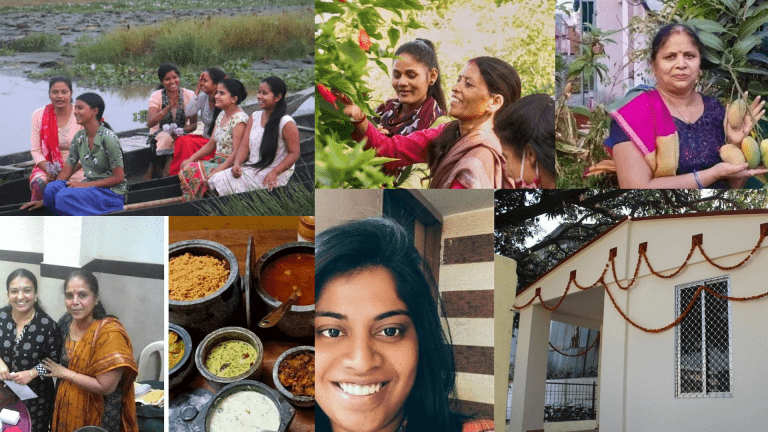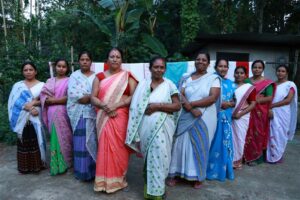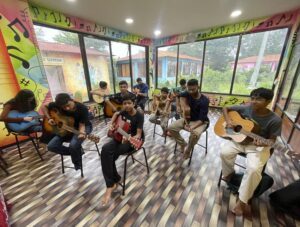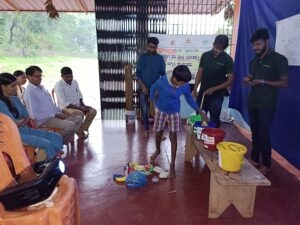This Women’s day, let’s celebrate women who have stepped out of their comfort zone, broken all the barriers around them to create a sustainable impact on the world, and on us.
- Home Garden With 100 Kinds of Plants Earns This Lady the Name of ‘Hariyali Didi’
Pushpa Sahu is a home gardener who grows over 100 types of plants, trees and shrubs, including a variety of organic fruits, vegetables and medicinal plants on her terrace, earning her the name ‘Hariyali Didi’.
Pushpa Sahu’s homegrown garden is a quintessential example of the beneficial home gardening lifestyle. Sprawled across the terrace of her house in Raipur, this garden is home to over a 100 types of trees, herbs, and shrubs that bear a variety of fruits and vegetables. This is where most of the family’s food is sourced from, providing them benefits of health, cost, and efficiency. The home gardener has about 10 types of fruits and 12 types of medicinal plants growing in her greenscape.
The space is studded with fruiting plants of guava, tangerine, mango, lemon, apple, papaya, dragon fruit, and gooseberry, among others, as well as over 20 types of vegetables like tomato, chilli, brinjal, bottle gourd, okra, and beans. Added to this are some ornamental plants, leafy greens like coriander, spinach and fenugreek, and aesthetically pleasing shrubs.
Pushpa has been building this garden since 2013 to feed her family with fresh organic produce and reduce their dependence on market visits.
2. Engineer Uses Farm Stubble to Build Eco-Friendly Homes, COVID Facilities & Schools
Shriti Pandey quit her construction job in the US to return home and build eco-friendly structures using farm stubble through her startup Stawcture Eco. However, three years since its inception, her startup Strawcture Eco has been credited with constructing two COVID-19 facilities in Bihar and Punjab, in addition to a labourers’ colony, classrooms for a 70-year-old school, as well as a government community kitchen and canteen, among other eco-friendly residential units.
Shriti’s company constructs fibre panels by combining agricultural waste and steel and encases their core in three layers of recycled paper. The straw panels, which can sustain up to 100 years, contain micro-pores that absorb and retain humidity until outdoor weather conditions improve.
3. Inspired by Granny, Duo Make & Sell Traditional Cookware that Use Less Oil, Gas
Bengaluru-based friends Revathi Venkatesh and Suma VS started Ajjiya Aramane (Grandmother’s Palace) to sell traditional cookware like kal chetti and thayir jadi. Revathi Venkatesh (47) and Suma V S (56) became friends because of their love for good food. In their quest to find new recipes and whip up new dishes, Revathi came across her grandmother’s old kal chetti (stoneware dish) in the attic. Given that it was lying there for almost three decades, Revathi and Suma spent some time researching on how to season it and start using.
Revathi says, “Finding the kal chetti was the turning point for us – both for our friendship and as a beginning of a professional relationship. What immediately pulled us to it was just how pretty and sturdy it was. We learnt how to ‘season it’ and I still remember the first time I cooked in it – the end result was pure magic. It reminded everyone of the taste of my grandmother’s food.” With the demand for the kal chetti going strong, the duo decided to diversify and include more products as well. Revathi says, “We started taking a keen interest in designing the products as well and came up with the idea of introducing a chapati box with a lid. This took a while but the designs were well appreciated and people started placing their orders for it. Then we introduced the masala box as well.”
4. Assam Girls Make 100% Compostable Yoga Mats That Could Save Our Lakes
To save the freshwater Deepor Beel lake in Assam from being choked by water hyacinth, six women have innovated 100% biodegradable yoga mats by recycling the invasive aquatic plant.
The women initiated the venture using their skills and received support from Meghalaya-based North East Centre for Training and Research (NECTAR) and Simang Collectives Pvt Ltd, a Guwahati-based social enterprise.
Rituraj Dewan, the co-founder of the social enterprise, says, “Nirmali Baruah, co-founder, works towards creating livelihood by following an approach of economic sustainability.” They note the traditional ways followed by the locals, who use sustainable practices in their lifestyle. “Using the resources from the vicinity, which are a part of their daily life, thus guarantees economic gains while being sustainable,” he adds.
Mitali says that if not for the initiative, she would have been married like other women in the village, depriving her of the opportunity to become financially independent. “Our venture is unique and has the potential to earn a good income. We wish to involve more women by offering free training and empowering the community,” she adds.
5. She Quit City Life For An Organic Farm In Uttarakhand That Saves 2 Lakh Litres Of Water
Amrita Chengappa moved to a small village in Uttarakhand in 2002 in search of a simpler life. With her partner, she runs SOS Organics that sells all-natural soaps, candles, home care items, teas, seasonings and cold pressed oils, all made with indigenous produce.
Amrita Chengappa, who left behind her bustling city life in Lucknow in search of something simple, remains mindful of these questions. In 2002, she, along with her husband Santosh, moved to Chitai Pant village in Uttarakhand’s Almora district to lead a better life. “The idea was not to come to a village and turn it into an industrial area.”
At SOS, the idea is to take as little from nature as possible. “The entire project runs only on rainwater harvesting. We don’t even have a Jal Nigam connection. We’re living in a rain shadow area that experiences a lot of water problems. Watching a local carry a 50-litre can of water so you can take a bath is an eye opening experience, and really made me think twice about my own water usage. So one of the first things we did was build water harvesting tanks, where around 2 lakh litres of water has been harvested. Around 70% of our power is solar-generated. We also aim to use whatever produce is already available here,” she says.
People looking to shift to a more sustainable lifestyle need to be open and prepared to learn a lot. When we began, we did everything by ourselves, because we couldn’t afford to hire anyone. Designing our first label, setting up our first website, the first photographs we clicked — that was all us.”





